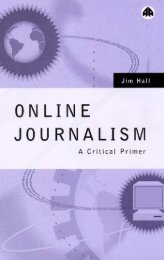Modul Mata Kuliah Journalisme Online - Ayo Menulis FISIP UAJY
Modul Mata Kuliah Journalisme Online - Ayo Menulis FISIP UAJY
Modul Mata Kuliah Journalisme Online - Ayo Menulis FISIP UAJY
Create successful ePaper yourself
Turn your PDF publications into a flip-book with our unique Google optimized e-Paper software.
Keen agreed that critical analysis — performed by trained journalists — is vital. However, he remained<br />
certain of his righteous cause: “We have nothing to learn from children,” he said, provoking a growl or<br />
gasp from many in the audience of some 300 people. His reference, if I’m not mistaken, was to<br />
Facebook users, and to the repeated examples offered by Harfoush and Brody of how younger people<br />
interact with media today.<br />
“It’s a return to the medieval,” Keen said. Today we have an elite of super media-literate individuals,<br />
while everyone else is swimming in garbage.<br />
Friday’s keynote speaker expressed some of the same ideas, although in a less arrogant manner.<br />
“Our audiences are literally drowning in information,” said Mike Oreskes, executive editor of The<br />
International Herald Tribune and author of a new book about the U.S. Constitution. (You’d think a guy<br />
who’s spent 30 years in journalism would have learned to use the word literally correctly.)<br />
“The solution to information overload is journalism,” Oreskes said. People want orientation and<br />
direction to lead them through the thicket of information. This sounded a lot like Keen, to me, and not<br />
like what I had heard from Brody and Harfoush. (Read more from Oreskes’s speech.)<br />
How Do You Decide What to Believe?<br />
Brody said people don’t trust — and don’t want to trust — only one news source. The days of the<br />
authoritative source have ended. “They want to triangulate truth on their own,” he said.<br />
“If you care, you’re going to pursue the information,” Harfoush said. There are topics that a given person<br />
does not consider interesting, but the same person will invest time and effort in finding out more about<br />
other topics. This is true whether that person is clicking on the Internet or standing in front of a rack of<br />
magazines at the newsstand. (Mathew Ingram live-blogged this panel discussion.)<br />
I was wondering whether journalists can make people care. I think if you tell a story really well, you can.<br />
Oreskes worries that “the solar system of YOU” (referred to by Brody on Wednesday night) is in mortal<br />
conflict with “the actual solar system” of reality, the world outside your personal life. The victim of that<br />
mortal conflict might be democracy itself, because democracy requires consensus and compromise —<br />
and you can’t achieve those if you don’t understand other people.<br />
I’ll be the first to stand up and agree with Oreskes that a key role of journalism is to help people<br />
understand the world — both the world outside their own home and the world on the other side of an<br />
ocean. But I question his assertion that there exists “an actual solar system” that any one journalist can<br />
accurately portray. The world represented by one person, or one news organization, is never going to be<br />
the same as the world seen by every other person. Everyone lives in the center of “the solar system of<br />
YOU.”<br />
Call Up Merleau-Ponty
















